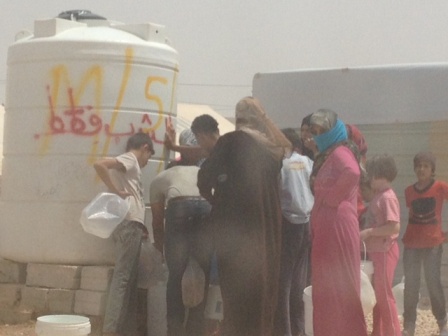A Contribution by Oxfam Public Health Engineer, Farah Al Basha
Incidentally, I met a journalist today. As I was drinking coffee with a friend of mine, she happened to be sitting next to me speaking loudly to the group she was with. When the word Za’atari was mentioned, it immediately caught my attention. Disregarding my manners, I couldn’t help tuning in to her conversation.
The journalist exclaimed, “I can’t understand why refugees are mad, they have everything they need, yet, they keep asking for more? They have water, toilets, food, they literally have everything yet they continue complaining! They even throw rocks at people! Honestly, we should be worried about our employees based there!”
I stared at her in disbelief, and turned to the table to ask if she worked in the camp. She replied pompously, “No, I’m a journalist and write many articles about the camp.” I followed up and asked, “Since you are a journalist you have been to the camp, is that correct?” She responded, “Yes, several times.” I persisted and asked, “during the several visits that you made to the camp, was there adequate time to allow you to judge the people and the situation?” She responded, “People are always mad, what exactly do they want? They are getting more than enough water, yet they ask for more! They have enough bathrooms for a camp, yet they also ask for more! They even ask for cleaning services for the bathrooms, can you imagine that? They also ask for better food! This is a camp not a 5 star hotel! And I’m not saying everyone is like this, there are a few good people.” Her words brought tears to my eyes and my mumbling turned into a loud voice, “Do you know the minimum humanitarian standards for a camp? Do you know the minimum amount of water they should have? Do you know how many people per latrine are in the camp? Have you ever shared your bathroom with 50 people? Would that make you angry? Have you ever waited for more than 40 minutes to get water to drink? I’m sure the answer is no”
She started to say “but…” and I told her there is no but!
“Behind the angry faces, there is a mother who lost her child, there is a sister who lost four of her siblings, and there is a wife who lost her husband. In the camp there isn’t enough water, people keep lining up for water all the time; I can show you pictures if you don’t believe me.”
I took a deep breath, drank the last of my cold coffee and left.
I don’t know why I got so upset when she talked about the refugees in the camp, but I couldn’t help but wonder if I altered her thoughts about the camp and the people. After four months of working amongst the Syrian refugees in Za’atari, I have realized that the camp is real, the stories are real, and the tragedy I see every single day is real. So as humans let us gather our efforts not to judge but to help, not to laugh at them but to listen to them, let us make their pain less real. Everyone can make a difference, even if you think it’s not much, even if you think it’s not important. Gandhi once said:
“It’s the action, not the fruit of the action, that’s important. You have to do the right thing. It may not be in your power, may not be in your time, that there’ll be any fruit. But that doesn’t mean you stop doing the right thing. You may never know what results come from your action. But if you do nothing, there will be no result.”


Thank you for the great piece, I even know a family who chose going back to syria and sadly got half of its members killed by bombings.
Your welcome .. Its sad